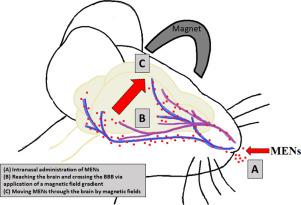Nanomedicine: Nanotechnology, Biology and Medicine ( IF 5.4 ) Pub Date : 2020-11-14 , DOI: 10.1016/j.nano.2020.102337 Marta Pardo 1 , Evan R Roberts 2 , Krystine Pimentel 3 , Yagmur Akin Yildirim 3 , Brayan Navarrete 3 , Ping Wang 3 , Elric Zhang 3 , Ping Liang 4 , Sakhrat Khizroev 3

|
The brain is a massive network of neurons which are interconnected through chemical and electrical field oscillations. It is hard to overestimate the significance of the ability to control chemical and physical properties of the network at both the collective and single-cell levels. Most psychiatric and neurodegenerative diseases are typically characterized by certain aberrations of these oscillations. Recently, magnetoelectric nanoparticles (MENs) have been introduced to achieve the desired control. MENs effectively enable wirelessly controlled nanoelectrodes deep in the brain. Although MENs have been shown to cross the blood–brain barrier via intravenous (IV) administration, achieving adequate efficacy of the delivery remains an open question. Herein, through in vivo studies on a mouse model, we demonstrate at least a 4-fold improved efficacy of the targeted delivery of MENs across BBB via intranasal administration compared to an equivalent IV administration.
中文翻译:

用于靶向大脑定位的磁电纳米粒子的大小依赖性鼻内给药
大脑是一个巨大的神经元网络,通过化学和电场振荡相互连接。很难高估在集体和单细胞水平上控制网络化学和物理特性的能力的重要性。大多数精神疾病和神经退行性疾病的典型特征是这些振荡的某些异常。最近,已引入磁电纳米粒子 (MEN) 以实现所需的控制。MEN 有效地启用了大脑深处的无线控制纳米电极。尽管 MEN 已被证明可以通过静脉内 (IV) 给药穿过血脑屏障,但实现足够的给药效果仍然是一个悬而未决的问题。在此,通过对小鼠模型的体内研究,


























 京公网安备 11010802027423号
京公网安备 11010802027423号